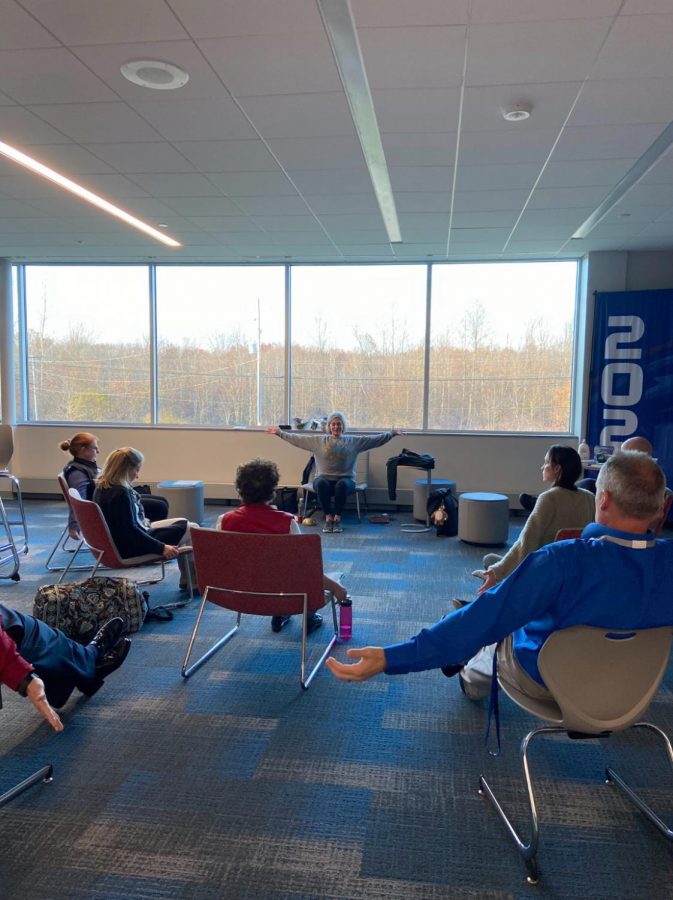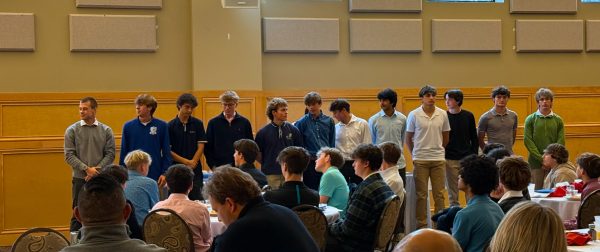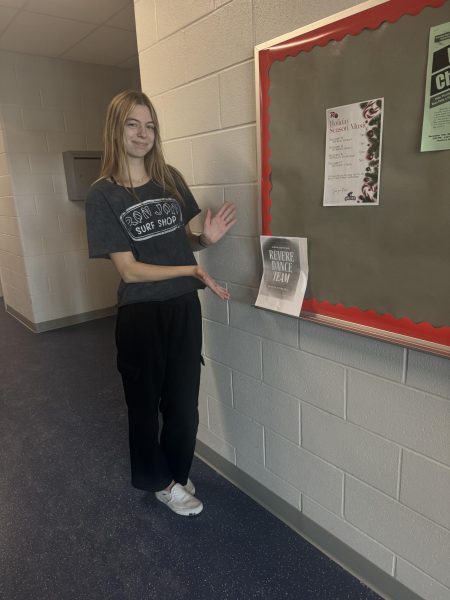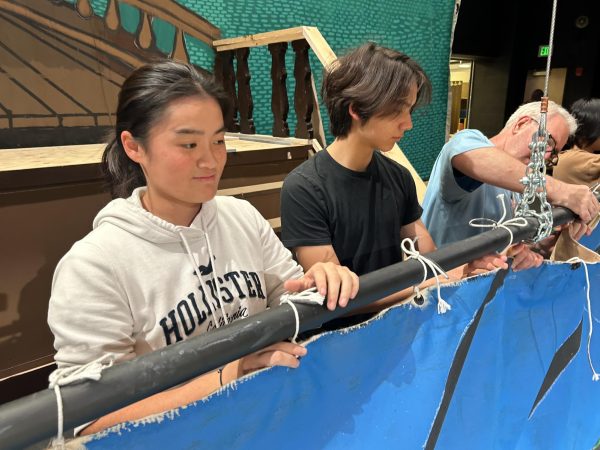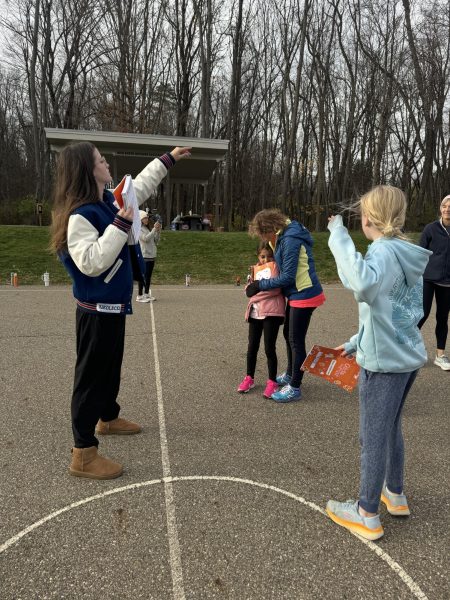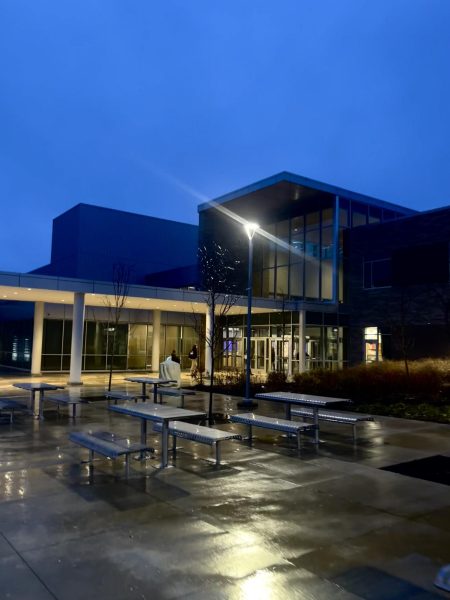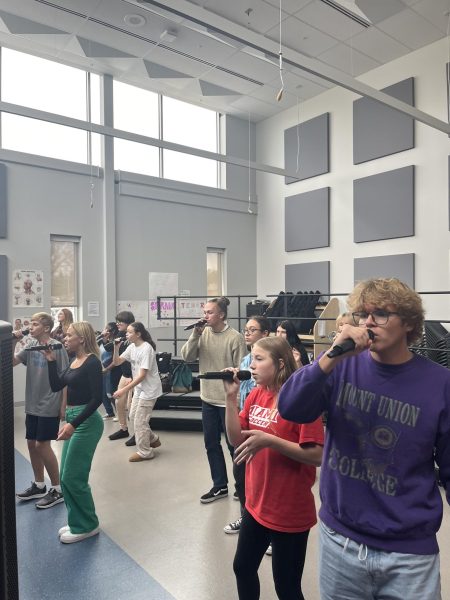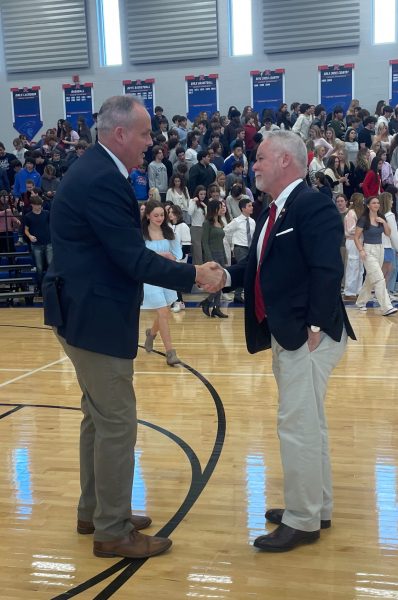Former teacher creates new mindfulness program
Jennifer Hayes creates a new program for mindfulness, management and movement.
Hayes leading staff with her program.
A handful of students are sitting in the A common room of Revere High School. Onlookers walk by on the way to the exit of the building, minutes after the bell rang to send the students home on a Tuesday afternoon. While movement takes place in the hallway, the students in the common room have their eyes closed and are sitting comfortably in their chairs. The only noise present is the humming vibrations from the “singing bowl” in the center of the circle of people. Jennifer Hayes is seen (not by the students) tapping the bowl with a mallet, as the students clear their minds. From the outside, this process looks like simple mediation, but Hayes also uses it to bring focus to individual parts of the body and clear the mind.
This whole process is a part of Hayes’s 3M program. The 3 M’s are mindfulness, management and movement. Through each of these techniques, she hopes to make people more aware of their mental health and overall help the student body and teachers alike.
Jennifer Hayes, a former elementary teacher, seeks to implement practices of mindfulness in each school in the Revere school district. She wishes to show students and teachers alike how to take time and reflect during the busy day.
“[I want to] bring awareness to our own selves, our bodies and our minds because we’re so busy all the time so practicing mindfulness and being able to find time in our day to pause the present,” Hayes said.
Mindfulness is just one third of Hayes’s program. Each “M” in the program is a technique that Hayes wants to teach through yoga and mediation in short periods of time. Hayes only utilizes a small amount of a student’s busy day in order to not take away from the body’s natural desire to move and be active.
“Our human bodies and brains don’t allow us to be mindful 100% for really long periods of time, we’re just not built that way, our brains are active all the time,” Hayes said.
Hayes also teaches her principles to teachers in the district. During the pandemic last year, she had to do everything via Zoom and focused on how to help people during that difficult time.
“We had a core group of adults that ended up coming. People signed up, and we covered a lot of self care. Things that hit staff and teachers a little differently than students,” Hayes said.
As a former teacher herself, Hayes understands the issues and struggles that teachers have separate from the students. She emphasizes the importance of focusing on those teachers who live the true “school life” that no other occupation could understand. School staff could be busy with bus duty at the end of the day or missing their family on the weekend. She wants to create a space where teachers could relate to each other and these issues that all staff face.
“I think that people who are in schools need to connect with other people because we speak a language that not everybody else does. I think that’s what makes my work or what I do with teachers relatable. I understand that’s in my world,” Hayes said.
Her husband, McClain Hayes, an English teacher at Revere High School, also understands this struggle. In her words, he is a “work-a-holic” and learns from her program. He manages his student’s mental health through his google form, “My Day,” to see how students rate their day and why they rated their day a certain number. The number ten being “the day couldn’t get better than this” and one “couldn’t be any worse than this.” He collects this data and adjusts his teaching on how his students are feeling.
“You can make some conclusions [from My Day] . . . I take this quantifiable data, and I can put it to some use. Some of the mental health elements that factor into it are not a matter of making it easy [rather] a matter of using the information that you get from students in determining how you [will run the class],” Hayes said.
While Hayes acknowledges that he is not a “data professional,” he knows what the trends in data means. Lower numbers during times of stress, for example, when a majority of students have an important test during the day, Hayes tries to change his teaching that day to alleviate stress. In no way is he attempting to coddle his students, but he wants to help set up their day to be less stressful. Hayes believes in a similar connectivity from class to class as if the school was a care center.
“There are so many things [occurring] that [schools] almost look like a clinical setting more than it does an educational setting. I was like, but why wouldn’t the school be a little bit more clinical in that it’s a care facility? So to start moving the needle a little, it’s more on trying to take some of those techniques,” Hayes said.
Hayes believes that a school should prioritize the mental health of its students in a clinical way. Schools could efficiently achieve this when there is more communication between classes and the techniques teachers use. Similar to My Day, teachers could have a view of a student’s schedule and how they are handling it mentally.
“You’re not feeling well right now in this period, but I should make sure that your other two or three teachers know that this is going on. Because if this is a care facility, then that kind of communication needs to be there,” Hayes said.
His wife has already begun to increase communication among teachers. Teachers that have not spoken or met each other can meet through an R&R program. R&R stands for reset and reflection and is simply the 3M program except for the students. Teachers from each school in the district meet and discuss their struggles and what they do to help students. One proponent and attendee of this program was Revere high school counselor Emily Rion. She and Mrs. Hayes became acquainted when Rion first arrived at Revere High School. Rion liked the techniques in Mrs Hayes’s programs and wanted to develop them further into high school.
“I started talking with her because we have a lot of things in common, and we talked about how we can incorporate more of what she does with yoga and overall wellness into our school,” Rion said.
Before the two could develop any plans, the pandemic reached the Revere district. At that time, each and every person was struggling to adapt to a completely different lifestyle.
“It wasn’t just our student body that was struggling, it was our staff as well. So I talked with Mrs. Hayes about that and she was like, ‘Why don’t we bring in a staff R&R?’ So she did that, and it was very successful,” Rion said.
With Hayes’s program, the teachers were able to talk about mindfulness with a deeper and adult perspective. From there, Rion began to talk to the administration in order to expand on the work she was already doing. Rion also incorporated these techniques into a club she advises called Active Minds. Mrs. Hayes attended a meeting to grasp how she could cater her 3M program to the students of Active Minds.
“She came into one of our meetings just to listen to what the students’ concerns were [and gauge] what we wanted to gain from the group this year. She was really able to formulate the [program around] the student’s biggest concerns,” Rion said.
Her program is how a handful of students were introduced to her practices of mindfulness, management and movement. Rion believes that these practices are not new to people, but they are very valuable during this time.
“The whole thought of mindfulness is not a new concept at all, but I think with the way things in our society, particularly our American society, is ever-changing and constant, [it] helps [people] to stop and think,” Rion said.
Rion said that the aspect of mindfulness is a big factor in her life. As a guidance counselor, her main focus is on the student, not the emails or phone calls. Mindfulness is being aware of yourself and focusing on what you need to do. Mrs. Hayes’s husband focuses on management in his classes and how he can help his students manage a difficult academic week while maintaining connection. Movement is being able to abandon a sedentary lifestyle. From the problems Hayes saw in her classroom during the time when she was a teacher, she became a mindfulness coach to tackle these problems.

